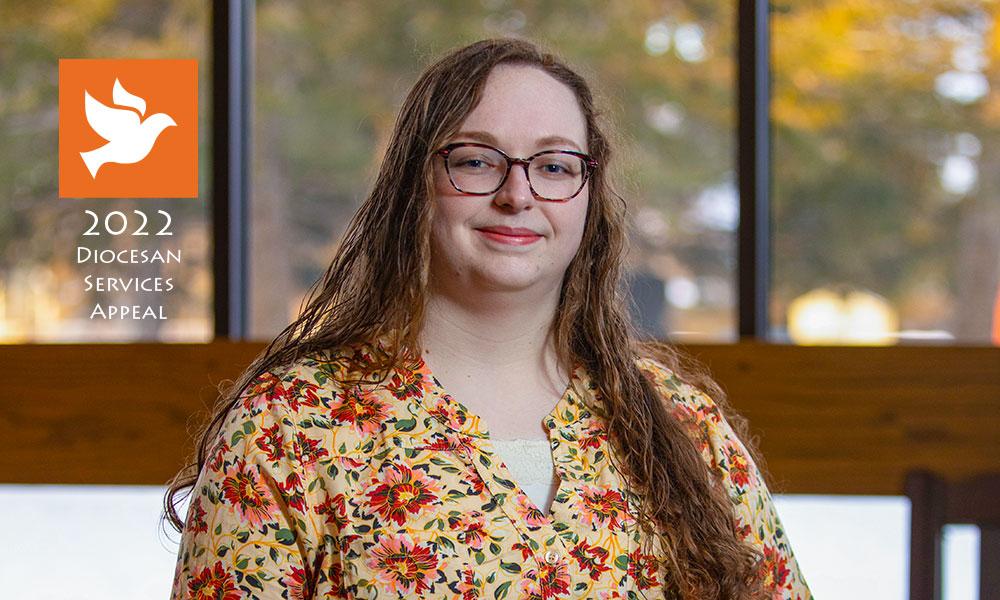
Office of Vocations Efforts Are Instrumental in Megan’s Journey of Discernment
For Megan Richardson, who was a junior at Michigan State University when COVID began, the uncertainty that accompanied the pandemic hit at a deeply spiritual level, even while being an opportunity for unexpected community and grace.
For Megan Richardson, who was a junior at Michigan State University when COVID began, the uncertainty that accompanied the pandemic hit at a deeply spiritual level, even while being an opportunity for unexpected community and grace.
For the past two years, Megan has been discerning a vocation to consecrated life — an umbrella term for vocations of celibacy, including the well-known life of religious sisters, as well as consecrated virgins who continue living in the world. After graduating with a degree in chemical engineering and a minor in food science, Megan now works as a lab technician in Grand Rapids, offering her free time to serve as a parish catechist and continuing her discernment process through the connections she made while living in the Diocese of Lansing.
In the midst of two years defined by Zoom meetings and social isolation, those connections have been a lifeline. Maintaining “a little community of support, even when it’s virtual” means having sisters who can share her experience in a way many other recent grads cannot.
“The main thing has been connectedness,” says Megan, who now leads a virtual group of women discerning religious and consecrated life. They read texts together on discernment and vocation, and their meetings are advertised by Dawn Hausmann, director of consecrated vocations for the Diocese of Lansing.
The discussions revolve around, “How does this [reading] relate to my life? Or struggles we all have with discernment,” Megan says. The result is a solidarity in “knowing that you’re not the only one asking these questions, the only one not dating or getting married or having kids at this point in your life.”
In facilitating those relationships and mentoring her in the process of discernment, “Dawn has been a huge help to me,” says Megan.
“The question just started growing inside of me,” she says. “[And] the push to at least investigate it kept getting bigger and bigger within me, to the point that my friends said, OK, you need to stop talking to us about it – you need to talk to someone who knows something about it.”
But at the time, in Megan’s mind, talking about a vocation meant committing to it, and that caused no small amount of anxiety. After a few weeks of wrestling with her fear, Megan ended up at eucharistic adoration at St. John’s Student Parish in East Lansing, emotionally unburdening herself in the confessional.
“I would not recommend doing it this way,” she laughs. “But I’m very thankful that I did. I’m thankful it was Father Gary [Koenigsknecht], because he was the calmest person … and he said to email him and set up a meeting to talk through my fears.”
Megan met with Father Gary a couple times before the pandemic began: “That was challenging, because I’d just started getting a handle on what discernment meant,” she says. “But honestly, what helped the most during COVID and isolation was to just keep praying.”
Even amid the pandemic, she was soon connected with Dawn and the Emmaus House, a residence for female college students open to discerning consecrated and religious life. The house takes its name from the Gospel passage when two disciples encounter the resurrected Jesus on the road to Emmaus.
Megan spent her senior year living in Emmaus House with four other women – “and a cat!” she adds – where the little community shared meals, hosted vocation-related events for other students and, every morning before the first housemate left for the day, prayed the Liturgy of the Hours together.
This past fall, she also participated in her first in-person “Nun Run” hosted by the Diocese of Lansing and led by Dawn Hausmann. The event brought women on a day-long tour of four religious communities with different spiritualities and callings, from religious sisters doing active ministry in Ann Arbor and Detroit to a cloistered Dominican convent in Farmington Hills. The costs of the Nun Run, the discernment groups Megan has been a part of, and the support provided by Dawn through the Department of Vocations are funded with DSA contributions.
“Getting a feel for different forms of prayer” during the trip was a valuable experience for Megan, who’s learned to view these visits as information-gathering opportunities: Is this a place and way of life I can see myself physically living? Is this a type of prayer that brings me closer to God?
For now, Megan is still gathering that information, praying and striving for faithfulness in her daily life. “I’m living the life of a single Catholic and trying to find where he's calling me in smaller ways,” she says. “There’s no timeline to discerning – no need to hurry up and rush it. You’re growing closer to God as you grow closer to your vocation, because God will be in whatever vocation you end up in.”
She paused, thinking back to the Emmaus House, where her senior year in a pandemic was able to be marked by community, a rich prayer life and the presence of God. “It’s very apt to name it that,” she says, “because you end up meeting Jesus along the way to where you’re going.”
For questions regarding vocational discernment or seminary formation, contact Father John Whitlock, director of vocations, at jwhitlock@dioceseoflansing.org. For questions regarding vocations to consecrated life, contact Dawn Hausmann, director of consecrated vocations, at dhausmann@dioceseoflansing.org.
